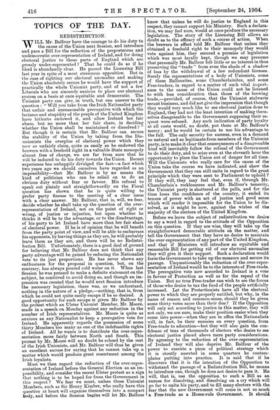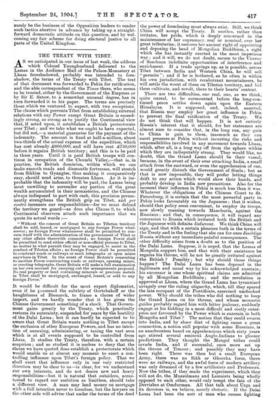REDISTRIBUTION.
WILL Mr. Balfour have the courage to do his duty to the cause of the Union next Session, and introduce and pass a Bill for the reduction of the preposterous and undemocratic over-representation of Ireland, and for doing electoral justice to those parts of England which are grossly under-represented ? That he could do so if he liked is abundantly clear. He passed the Licensing Bill last year in spite of a most strenuous opposition. But in the case of righting our electoral anomalies and making the Union absolutely secure be would have the support of • practically the whole Unionist party, and of not a few • Liberals who are sincerely anxious to place our electoral system on a basis at once equitable and democratic. The Unionist party can give, in truth, but one answer to the question : "Will you take from the Irish Nationalist party that unfair and unreasonable prerogative with which the • laziness and stupidity of the people of the United Kingdom have hitherto endowed it, and allow Ireland her fair share, but no more than her fair share, in deciding whether the Union shall be maintained or dissolved ? But though it is certain that Mr. Balfour can secure the stability of the Union by taking from the Dis- unionists the overplus of electoral power which they now so unfairly claim, quite as easily as he endowed the brewers with a freehold right in a valuable State monopoly almost free of charge, we are far from sure that he will be induced to do his duty towards the Union. Recent • experience has unhappily divulged the fact—a fact which two years ago we should ourselves have regarded as an impossibility—that Mr. Balfour is by no means the kind of politician who can be relied on to do an obvious duty without fear or favour. His refusal to -speak out plainly and straightforwardly on the Fiscal question has Blown that he is quite willing to prefer party finesse to the meeting of a clear issue with a clear answer. Mr. Balfour, that is, will, we fear, decide whether he shall take up the question of the over- representation of Ireland, not on the point of right or wrong, of justice or injustice, but upon whether he thinks it will be to the advantage, or to the disadvantage, of his party to let Ireland have more than her fair share of electoral power. If he is of opinion that he will benefit from the party point of view, and will be able to embarrass his opponents, by leaving things as they are, he will probably leave them as they are, and there -will be no Redistri- bution Bill. Unfortunately, there is a good deal of ground for believing that Mr. Balfour does not think that any party advantage will be gained by reducing the Nationalist vote to its just proportions. He has never shown any enthusiasm for the proposal in question, but, on the contrary, has always poured cold water on it. When last Session he was pressed to make a definite statement on the subject, he contrived to avoid doing so, and though an im- pression was created that he would next Session introduce the - necessary legislation, there was, as we understand, nothing in the nature of a pledge,—nothing, that is, from which he could not quite easily escape if he so desired. A good opportunity for such escape is given Mr. Balfour by the protest which an Ulster Unionist Member, Mr. Moore, made in a speech on Monday against any reduction in the number of Irish representatives. Mr. Moore is quite as anxious as any Nationalist to keep a prerogative vote for Ireland. He apparently regards the possession of some thirty Members too many as one of the indefeasible rights of Ireland. All he wants is to distribute the over-repre- sentation more fairly between North and South. This protest by Mr. Moore will no doubt be echoed by the rest of the Irish Unionists, and Mr. Balfour will thus be given an excellent excuse for saying that he cannot take up a matter which would produce great resentment among the Irish loyalists. Must we then regard the reduction of the over-repre- sentation of Ireland before the General Election as an im- possibility, and consider the recent Ulster protest as a sign that nothing is to be hoped for from the Government in this respect ? We fear we must, unless those Unionist Members, such as Sir Henry Kimber, who really have this question at heart will organise themselves into a compact body, and before the Session begins will let Mr. Balfour tion, we may feel sure, would at once produce the necessary legislation. The story of the Licensing Bill allows no doubt as to the efficacy of such a course of action. When the brewers in effect told Mr. Balfour that unless they obtained a freehold right to their monopoly they would vote against him, they secured a promise of legislation which was most loyally kept, though we may presume that personally Mr. Balfour felt little or no interest in thus preserving the ".trade" from even the shade of a shadow of loss by the withdrawal of a few redundant licenses. Surely the representations of a body of Unionists, some of them Balfourites, some Chamberlainites, and some Free-traders, in regard to a matter of such vital import- ance to the cause of the Union could not be listened to with less consideration than those of the brewing trade,—provided, of course, that the Unionist stalwarts meant business, and did not give the impression that though they would very much like to see electoral justice done to England, they had not the least intention of making them- selves disagreeable to the Government supposing their re- quest were refused. Any such indication of party loyalty at all costs would, no doubt, put them at Mr. Balfour's mercy; and he would be certain to use his advantage to the full. The only security for success, even in a demand so natural and so legitimate from members of the Unionist party, is to make it clear that consequences of a disagreeable kind will inevitably follow the refusal of the Government to do their duty, and to seize even at the eleventh hour the opportunity to place the Union out of danger for all time.
Will the Unionists who really care for the cause of the Union take the course we have indicated, and show the Government that they can still unite in regard to the great principle which they were sent to Parliament to uphold ?
If they will, they may feel that, even if, through Mr. Chamberlain's recklessness and Mr. Balfour's temerity, the Unionist party is shattered at the polls, and for the time loses the confidence of the country, it ended its tenure of power with an act of justice and good sense which will render it impossible for the Union to be dis- solved, as it might be now, against the wishes of the majority of the electors of the 'United Kingdom.
Before we leave the subject of redistribution we desire to say a word in regard to the attitude of the Opposition on this question. If they are wise, they will take up the straightforward democratic attitude on the matter, and tell the Government that they have no desire to maintain the over-representation of any part of the United Kingdom, and - that if Ministers will introduce an equitable and reasonable Bill for getting rid of our electoral anomalies they will give it their support. Such a declaration would force the Government to take up the measure and secure its passage. Unquestionably the reduction of the over-repre- sentation of Ireland would be to the interests of Free-trade. The prerogative vote now accorded to Ireland is a vote in favour of Protection as well as for the repeal of the Union. But no true Free-trader can wish to see the forces of those who desire to tax the food of the people artificially increased. Let the Protectionists have all the electoral power to which they are properly entitled, but why, in the name of reason and common-sense, should they be given some thirty votes more than their due ? If the Opposition will only act according to justice in this matter, they will not only, we are sure, make their position easier when they come into power—when they are in office the Nationalists will, in fact, be their enemies on every question, from Free-trade to education—but they will also gain the con- fidence of tens of thousands of electors who desire to see electoral justice placed above mere party considerations. By agreeing to the reduction of the over-representation of Ireland they will also deprive Mr. Balfour of the power to execute a piece of political strategy which it is stoutly asserted in some quarters he contem- plates putting into practice. It is said that if he discovers that it is the intention of the Opposition to withstand the passage of a, Redistribution Bill, he means to introduce one, though he does not desire to pass it. He will, that is, use the opposition to such a Bill as an excuse for dissolving, and dissolving on a cry which will go far to unite his party, and to fill many electors with the fear that the new Government will come in not so much a Free-trade as a Home-rule Government. It should surely be the business of the Opposition leaders to render such tactics abortive in advance by taking up a straight- forward democratic attitude on this question, and by wel- coming any fair scheme for doing electoral justice to all parts of the United Kingdom.







































 Previous page
Previous page